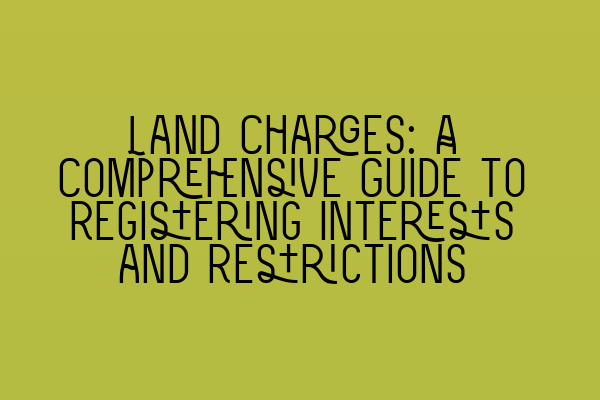Land Charges: A Comprehensive Guide to Registering Interests and Restrictions
Welcome to the SQE Property Law & Land Law blog. In this comprehensive guide, we will delve into the world of land charges and explore the process of registering interests and restrictions on properties. If you are a solicitor or anyone involved in the property industry, this guide will provide valuable insights into the intricacies of land charges registration.
What are Land Charges?
Land charges are legal interests or restrictions that affect land or property. They can include rights of way, restrictive covenants, mortgages, and other encumbrances. These charges are registered in order to protect the interests of individuals or organizations who have rights over a particular property.
Understanding land charges is crucial for solicitors and property professionals, as it allows them to provide accurate advice to clients and ensure that transactions are carried out smoothly without any unexpected surprises.
The Importance of Registering Land Charges
Registering land charges is essential as it establishes legal certainty and provides notice to the world about the interests or restrictions affecting a property. By registering these charges, potential buyers, lenders, and other interested parties can easily access this information and make informed decisions.
Failure to register land charges can have serious consequences. Without proper registration, subsequent purchasers may acquire the property without knowledge of the existing interests or restrictions. This could lead to disputes and legal complications down the line.
The Process of Registering Land Charges
Registering land charges involves several steps that must be followed meticulously. Let’s explore the process in detail:
1. Identify the Relevant Land Charge
The first step is to identify the specific land charge that needs to be registered. This could be a right of way, a mortgage, or any other restriction affecting the property. It is essential to have a clear understanding of the nature and extent of the charge before proceeding.
2. Obtain the Necessary Documentation
Once the relevant land charge has been identified, the next step is to gather the necessary documentation. This may include deeds, contracts, or any other legal documents that evidence the charge. It is crucial to ensure that all documentation is complete and accurate to avoid any potential issues during the registration process.
3. Complete the Appropriate Forms
After obtaining the required documentation, the next step is to complete the relevant registration forms. The exact forms will depend on the type of land charge being registered. These forms typically require detailed information about the property, the parties involved, and the nature of the charge.
It is essential to fill out the forms accurately and legibly to avoid delays or complications. Any errors or omissions could result in the rejection of the registration, leading to unnecessary delays.
4. Pay the Applicable Fees
As with most legal processes, registering land charges incurs fees. The applicable fees will depend on the type and value of the charge being registered. These fees must be paid in order to complete the registration process. Failure to pay the fees may result in the rejection of the application or delays in the registration process.
5. Submit the Application
Once all the necessary forms have been completed and the fees have been paid, it is time to submit the application to the appropriate authority. The exact authority will depend on the type of charge being registered and the location of the property. In England and Wales, land charges can be registered with the Land Registry or the appropriate local authority.
6. Await Confirmation and Registration
After submitting the application, it is a waiting game. The relevant authority will process the application, verify the information, and make a decision regarding the registration. If all the requirements have been met and the application is deemed valid, the land charge will be registered.
Conclusion
Registering land charges is a crucial aspect of property law and is essential for ensuring legal certainty and protecting the rights of individuals and organizations. By following the comprehensive guide outlined in this article, solicitors and property professionals can navigate the process of land charge registration with confidence.
If you found this guide helpful and wish to further enhance your knowledge in property law, make sure to check out our related articles:
- SQE 1 Practice Exam Questions
- SQE 1 Practice Mocks FLK1 FLK2
- SQE 2 Preparation Courses
- SQE 1 Preparation Courses
- SRA SQE Exam Dates
Remember, staying informed and up-to-date with changes in the law is crucial for success in the legal profession.
